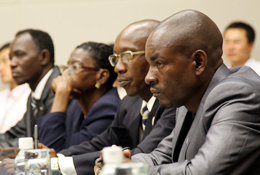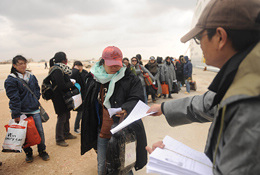 |
 |
|
LEADER TRAINING: African students take a course at the China Executive Leadership Academy Pudong on May 11, 2011. The Shanghai-based academy has provided training programs for government officials from more than 40 countries (WANG YUAN) |
TEMPORARY ID: Evacuees stand in line to receive their temporary identity documents issued by the Chinese Embassy in Libya, before boarding a Greek ship in Benghazi on February 25, 2011 (YU YANG) |
In recent years, Chinese diplomats have showed many examples of "creative involvement," especially when dealing with emergencies. For example, Ambassador Liu Guijin was appointed as China's special representative for Darfur in 2007. During the following years, he visited almost every region in Sudan and patiently mediated among leaders of different tribes. In a sense, it is this Chinese ambassador's patient and meticulous work that has helped China maintain good relationships with both Sudan and South Sudan. In this example, "creative involvement" was China's initiative to address a global concern. Other examples include the six-party talks on the Korean Peninsula nuclear issue, Chinese warship escorts in pirate-infested Somali waters and joint patrols along the Mekong River with Thailand, Myanmar and Laos.
From February to March 2011, the Chinese Government evacuated more than 35,000 citizens from Libya, which was then under threat of war. This can be an action of "creative involvement" worth analyzing, because it created several records in the history of China's diplomacy. This was the first time China evacuated citizens from a conflict-ridden foreign country using land, air and ocean passages, the first time it rented civil aircraft, foreign ships and planes on a large scale, the first time it ferried its citizens to third countries before getting them home, and the first time embassy officials issued emergency travel documents to prove Chinese evacuees' identities.
The evacuation, which was jointly conducted by the Chinese military, government departments and companies, displayed China's capability in overseas citizen protection. It reflected China's good relations with related countries, outstanding negotiating ability, strong financial power and impressive ability of mobilization and organization. In recent years, the Chinese Government and Chinese people have attached unprecedented importance to the protection of overseas interests, which demands the joint use of China's military, commercial and diplomatic power.
"Creative involvement" can show its special advantages when an emergency happens. But it is more than crisis management. It encourages well-designed diplomatic plans and a proactive approach, which can be applied when handling day-to-day diplomatic affairs.
Let's take the Sino-African relationship for example. The development of future Sino-African relations should be based on real mutual benefit and win-win solutions, requiring China to provide more assistance and public goods. When cooperating with African nations, China ought to offer more training courses to government officials, teachers and financial officials as well as proper technologies, such as solar energy and environmental protection. Some of these programs are already being carried out.
In the meantime, China should share its experiences and lessons on development with African nations. China's development is not a zero-sum development, in which one country's development results in another country's poverty. China's development is not a development of individual strength, but a development that can be shared. This kind of development is what the new world needs. Through "creative involvement," China helps make the world more peaceful and prosperous.
Email us at: yanwei@bjreview.com |
